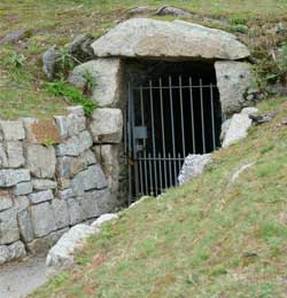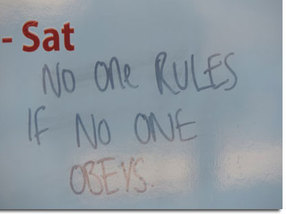Catching panthers in red weather
“Black Panther” is an oxymoron. Is that the word? Don't know, don't care. Panthers are already black, so if we’re trying to be too clever by half, a black panther is a black black animal. No, technology, I did mean to write that. Try to keep up. The Black Panther movement had a reason to emphasise the colour, and I think I read that it was formed shortly after the comic-book hero first appeared (I’m not suggesting a link). Back then, yeah, Black Panther made sense as a name, although for example Shaft (1971) got away with not being identified by one characteristic. As did Kojak (TV, 1973 to 1978, although his thing was more of an addiction than a non-hairstyle), and more to the point I suppose, the differently abled superhero Daredevil (the 2003 film, for example).
|
I look out at the vast certainties expressed by those who take it upon themselves to tell us what we should do with our lives, and I think: yes, but what if you’re wrong?
However confidently you tell us what we “must” do to save ourselves, the future remains unknowable and your conviction, your apparently unshakeable confidence, remains bizarre. Yes, the facts stack up behind this argument, and the right answer seems clear-cut and obvious, but do you ever lie awake at night worrying that the facts might change? My favourite quotable cigar-smoking American cultural critic with a centre parting, H L Mencken, once wrote, “For every complex problem there is an answer that is clear, simple, and wrong.” I suspect that the better approach to a complex problem would be to keep the question open, rather than to fix on an answer. Facts change. Complex problems change as you work through them. Mencken also wrote, “The whole aim of practical politics is to keep the populace alarmed.” |
That rough beast again
Terrorism is a symptom of what’s wrong with our culture(s), as are: racism, sexism, trolls on the internet, unemployment, mass migration, hospital-acquired infections, the “obesity epidemic”, poverty, global warming, a lot of advertising, most of modern politics, and a lot else besides.
There would be no terrorism if the promises of western civilisation were met. If (for example) a young Muslim boy could grow up in an outer suburb of Paris or Brussels, pass through an effective education system that enabled him to find and hold down a job – and feel good about himself while doing so – and then find a life partner, raise a family, grow old in security, die in peace – there would be no terrorism. |
Yeah, yeah, Brexit
There'll be a lot of hindsight after the result of the Remain/Brexit vote is announced. We'll hear explanations of why it was always going to be this way (hold onto nurse...), or perhaps a consensus will form on what was the decisive moment, or intervention, and then we'll all settle into a relentless "national conversation" about who's likely to take over from David Cameron as leader. "Ordinary people", as the BBC insists on calling us, will get on with their lives. But the media-political class will keep its knives out ("for fear of something worse," to continue the misquotation of Belloc), and the governance of the country will amble on it its present-participle near-stasis.
|
No Luddites here
We've had millennia to develop convenient applications for day-to-day tasks. Stone tablets, pens and paper, typewriters. Illuminated manuscripts, glossy magazines. Horses, chariots, stagecoaches, horseless carriages. Now we've invented digital, and with it, a one-answer-to-everything approach to developing convenient applications for day-to-day tasks. We're going to Harness The Power Of Technology, or some variation on that phrase, to solve whatever problem we have.
|
Remember that fridge?
Turned up Facebook the other day, and for once, had an answer to the question, "What's on your mind?" It was the name of a local marketing-services consultancy. It occurred to me that I didn't quite know why I had the said outfit on the brain, but its name came immediately into my head when I looked at Facebook's question. So I wrote it down, along with a paragraph wondering why it had managed to get so firmly lodged between my ears.
|
State of the Union
Several commentators today saying that they've lost confidence in the US. Making their point by talking up the glories of the past. After two weeks of the current administration, they're not going back.
Were they wrong, and they've seen the light? Or has the US changed? I guess the latter is the intended meaning, and perhaps - no, self-evidently - the election of the current President indicates a change in the attitudes of his fellow Americans. I'll leave out the Mencken quote about the kind of person the US system will eventually deliver to the presidency. We should at least acknowledge the possibility (I'm not arguing this) that Trump might be the right man for the job, even if only in the sense that he'll have a cathartic effect on the world order, wake people up, focus people's attention on the system's workings, because that might get us to the right question. Not everything is oldWhere do ideas start? Innovation is so often just combining a new technology with an established practice in a way that increases efficiency at the cost of the personal touch. I begin to think that taking the people out of the equation mistakes some kind of basic efficiency with effectiveness. We're not really satisfied with a machine response. Or are we?
|
Then, we'll be different
Striking, how many familiar events are not running to the old rules these days. Just read another newspaper article on Brexit, on the theme "Then you'll be sorry!" - and listened to a brief interview on the radio about Trump's likely appointment of a non-diplomat to be Secretary of State. When we realise that we're all poorer, we may indeed be sorry, but will we realise that we brought it on ourselves by collectively voting to Leave the European Union? Will we think of a European road not travelled, on which we'd all be (ha ha) prosperous? Or find some other cause for our poverty in all the events, et cetera, that have happened since June 2016? More.
Intelligent roads?
There's so much plastic floating around the world's oceans that it must qualify as a natural resource by now. More easily mined than coal, I imagine. There was a conversation the other day about grinding up plastic to make road surfaces. Today, there's a piece in the Weekend FT about wearable tech. Maybe sometime soon the folk at Google working on self-driving cars are going to have the idea of self-driving roads. Not like Scalextric exactly, but car and road in harmony, exchanging data/information about traffic conditions, upcoming signals and restrictions, et cetera. More.
|
So what do you think?
"Good customer service is really, really important to us," said the recorded woman's voice on the cold call I received just as I was walking back to the car with the parking ticket the other evening. We were going out to eat. Didn't catch the name of the company, although I let the call run for a bit, but I did appreciate the bone-headed irony of talking about customer service via a badly timed, recorded cold call.
|
Suitcase of my dreams
Sitting over a flat white at the Costa Coffee in the departure lounge of Dubai International Airport the other day, not twenty-four hours after I'd visited the Waitrose in the main Dubai shopping mall (the one with the aquarium, in the financial district), I happened to notice, above my head, an ad for Samsonite luggage.
|
Not in Cathcart
One of my favourite pieces of writing is a short story called The Wendigo by Algernon Blackwood. It's dated (published in 1910) and I wouldn't necessarily recommend anything else by the same author. But The Wendigo does one thing exceptionally well. It's set in the "Canadian backwoods", and Blackwood writes so effectively about "the wild solitudes" and the "singular spell which the wilderness lays upon certain lonely natures", that I read it again just to revisit the setting.
The presence of air
We talk about life as a gift. We talk about life as an opportunity to grow. We choose these lives, and they're our gift to our selves. That sounds great when we're all sitting in a circle and we've just been walking through a garden with our eyes closed. It's warm, and it's restoring, and it's reassuring.
But it's also true during an argument, after an embarrassment... |
A chakra-coloured sky
Such a sunrise. Driving out to meet the school bus, the contours of the landscape made into lines by the early mist; the trees drawn with such a fine pencil against the light. The sun red on the horizon, not moving for that first stretch over the high ground, then as we went down into the lane, the tunnel of road closed over by the trees, the horizontal bars of light. Stretches of wet grass where the bus was waiting, the sea in the distance, the sun getting its act together and properly bright.
|
Swim. Fly.Stormy morning. Rain and big billowy wind. Woke early, then a pleasant hour with the papers in the kitchen, then the sudden thought: get on. Transitions these days - there seems to be no choice about them; sometimes they're hard, sometimes they don't exactly trigger bouts of self-approval. A symptom of the times, perhaps: blogs I follow have gone quiet. So have I. But the weather, the serendipities, the nudges, the sharp and unwelcome jabs in the metaphorical ribs...
|
What have we lost?
Once, we hunted. Now we drive to the supermarket. Once, we cleared ground, cleared forest, made tools out of stones, made fire, discovered the workings of seasons and seeds and water, raised what we needed, feared the anger of clouds, marked days and time, accepted the spirit-shapes of our imagination, stored food for the winter, ate and celebrated the turning of nature's seasons and our own, gave names to the incarnations of nature, raised children, saw fish in the sea and went out over the sea, built homes, gathered into settlements, became communities.
|







